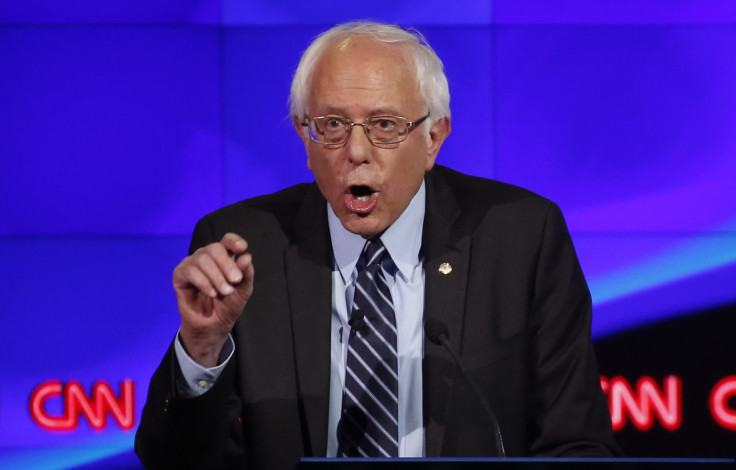Is Bernie Sanders A Socialist? During Democratic Debate, Candidate Slams 'Casino Capitalist Process'

Very early in the Democratic presidential debate Tuesday night, CNN moderator Anderson Cooper gave Vermont Sen. Bernie Sanders a chance to defend his “Democratic socialism.” Sanders focused on inequality, as he has done throughout his campaign, and he came out swinging with a strong response.
“We should look to countries like Denmark, like Sweden and Norway,” Sanders said, emphasizing that the U.S. has a lot to learn from countries who provide healthcare and other services for their citizens. But Anderson pushed Sanders on the issue, saying that a Republican attack ad practically writes itself with regard to the candidate’s socialist views. He asked Sanders directly if he is a capitalist.
“Do I consider myself part of the casino capitalist process by which so few have so much and so many have so little?” Sanders replied. His answer: “No.”
Sanders’ main opponent, Hillary Clinton, jumped in on the question, saying that she agreed with Sanders’ views on the problems with income inequality. However, she defended capitalism and said it would be a mistake for Americans to abandon capitalism, because it helps small-business owners and created the middle class.
"I believe in a society where all people do well, not just a handful of billionaires." -Bernie #DemDebate
https://t.co/WVrHTKGPnj
— Bernie Sanders (@BernieSanders) October 14, 2015Tuesday’s debate was expected to be an important night for Sanders. While he has been gaining momentum and drawing large crowds on the campaign trail, Sanders is not well-known among key areas of the Democratic electorate, and the opening Democratic debate was his first major chance to introduce many mainstream Democrats to his message.
Perhaps the area where he has most work to do is among nonwhite voters. Sanders has about 25 percent support nationally, according to the Real Clear Politics polling average, but among minority voters, that number drops significantly. The latest YouGov poll found Sanders with 34 percent support among white Democratic voters, compared with just 13 percent among Hispanics and 8 percent among blacks.
But another big focus for Sanders is convincing viewers that his proposals are reasonable, despite the fact that he continues to identify as a Democratic socialist. Prior to the debate, his opponents had not taken many shots at the Senator over his anti-capitalist feelings.
Going into the debate in Las Vegas, Clinton held 43.3 percent support in the Real Clear Politics average, while Vice President Joe Biden -- who did not join the debate and has not announced whether he is running for president -- is at 17.4 percent. Former Virginia Sen. Jim Webb is at 0.9 percent, former Maryland Gov. Martin O’Malley is at 0.4 percent, and former Rhode Island Gov. Lincoln Chafee takes the bottom with 0.3 percent support.
© Copyright IBTimes 2024. All rights reserved.






















